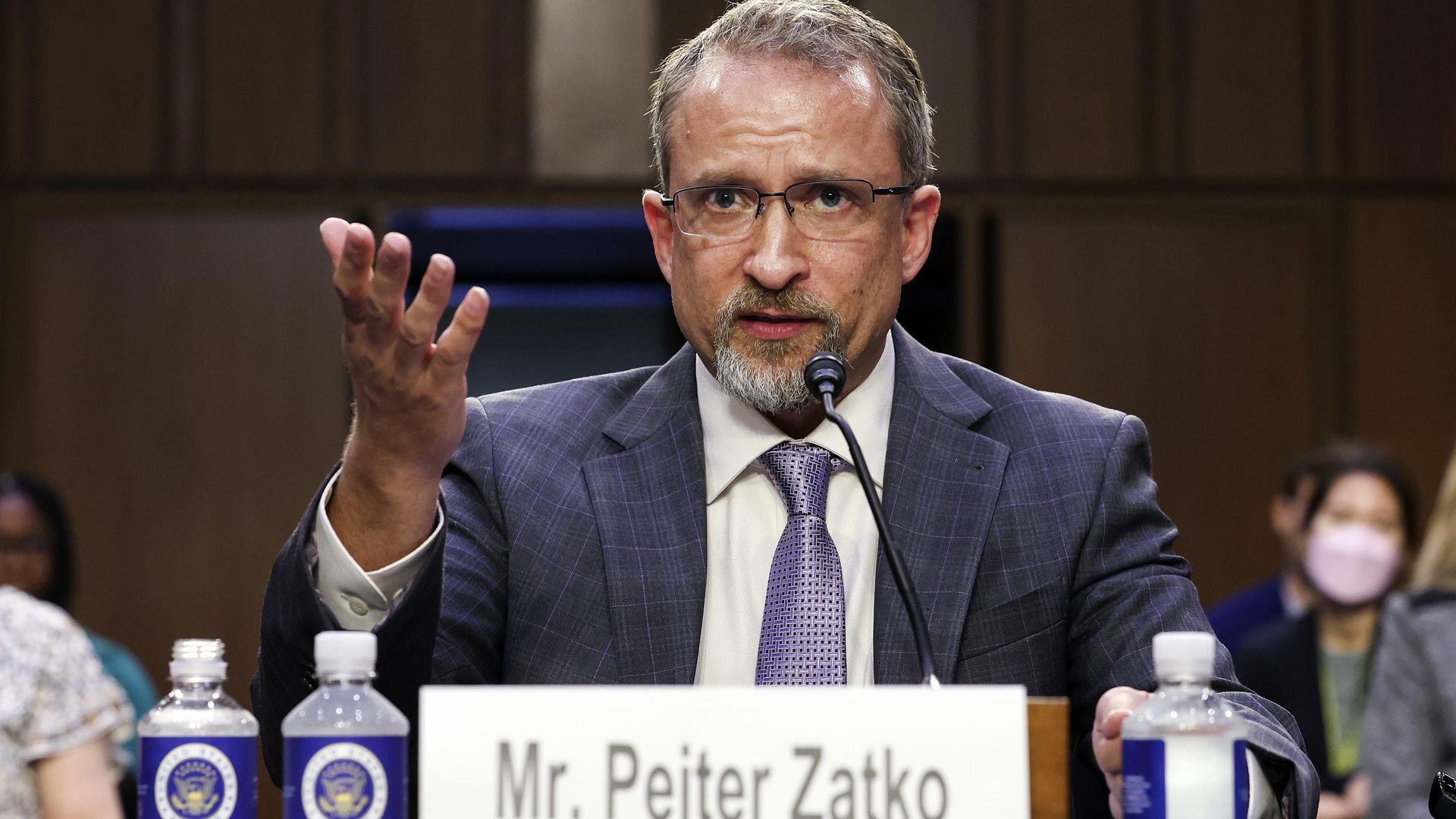| | | | | | | Presented By Computer & Communications Industry Association | | | | Axios Login | | By Ina Fried · Sep 14, 2022 | | The hardest part of being on the East Coast is the sports go so late. Don't worry, I still stayed up to watch Game 2 of the WNBA finals. Congrats to the Las Vegas Aces, who are now one win away from a title. 💰 Situational awareness: A top EU court upheld an antitrust decision against a Google challenge, levying a $4.1 billion dollar fine against the search giant for anticompetitive practices. Today's newsletter is 1,292 words, a 5-minute read. | | | | | | 1 big thing: Twitter whistleblower's testimony is no boon for Musk |  | | | Photo: Kevin Dietsch/Getty Images | | | | Twitter's former security chief, whistleblower Peiter "Mudge" Zatko, levied a host of accusations against the platform before the Senate Judiciary Committee Tuesday, saying Twitter maintained lax security standards, did not vet employee access to user data and would not improve its practices even in the face of government fines, Axios' Peter Allen Clark and Sam Sabin report. Why it matters: The testimony comes as Twitter's court fight to get Elon Musk to make good on his deal to buy the company for $44 million moves forward, but it did not appear to offer much new ammunition for Musk's case. - The hearing's focus was on national security, and very little of Zatko's testimony covered Musk's main argument since July for leaving the deal: his charge that Twitter has been untruthful about the number of bots and fake accounts on the platform.
When Zatko's whistleblowing report became public last month, it appeared that his complaints against the company could be of use in Musk's defense. - The judge in the case, which is set for trial beginning Oct. 17, ruled last week that Musk could introduce this new evidence to the proceeding.
While Zatko's Tuesday testimony was light on bot-talk, he elaborated on the many security risks he says he observed in his position before the recently installed CEO Parag Agrawal fired him last January. - Zatko said that he found that Twitter's engineers, some 4,000 employees, all had extensive access to company and user account data.
- He said that one-time government fines for violating regulations — such as the $150 million Twitter paid to the Federal Trade Commission over improperly selling user data earlier this year — were built into the company's operating budget.
Twitter has said that Zatko's complaint is "riddled with inconsistencies and inaccuracies." The intrigue: Senators from both parties made it clear they support increased government regulation of Twitter and other social media platforms — and that would affect Twitter's future, whoever wins in court. - Zatko said he was concerned the FTC didn't have the resources to properly investigate Twitter's security protocols or vet the information that Twitter provided to the agency.
- Sen. Richard Blumenthal (D-Conn.) suggested the creation of a wholly new agency focused on enforcing tech regulations.
- Yes, but: Years of similar hearings have not moved Congress to approve broad legislation imposing new regulations on the industry.
Yes, but: Zatko's 200-page whistleblower report filed with Congress and other U.S. agencies could still cause Twitter problems and help Musk's case. - Parts of his testimony alleged poor internal reporting practices, which could conceivably be used by Musk in his case.
- "You were rewarded based upon relationships and how you performed in an emergency — not for identifying existing errors and doing the ground work for keeping the lights on and running the business," Zatko told the committee.
What's next: As with last year's Facebook whistleblower Frances Haugen, Zatko could be called before lawmakers again. Meanwhile, Twitter shareholders voted to formally approve the company's purchase by Musk, even as its fate remains in the air. |     | | | | | | 2. Ethereum "Merge" should lessen power use |  | | | Illustration: Victoria Ellis/Axios | | | | The world's second biggest blockchain, Ethereum, will pivot in the next 24 hours or so to a new method of assuring — in real time — that transactions are valid. The new architecture, called The Merge, will use vastly less electricity, Axios Crypto's Brady Dale reports. Why it matters: Cryptocurrency's critics point to all the power it uses to secure its networks, but, with this switch, Ethereum will need perhaps just 1% of what it has been using. Plus it will no longer require specialized equipment. Context: At their core, all cryptocurrency networks are ledgers with records of how much money everyone using each one owns. Because they have no leaders, they use innovative strategies called consensus mechanisms to make sure everyone agrees that no user spent any money they didn't really own. - Proof-of-work, the original such strategy used by both Bitcoin and Ethereum, is the one that uses a lot of electricity.
- With The Merge, Ethereum is switching to proof-of-stake, which requires a user to put up cryptocurrency as collateral rather than perform power-intensive computer work to validate a transaction.
- Most newer blockchains (such as Polkadot and Solana) have been proof-of-stake from the beginning.
The point of both consensus mechanisms is simply to make misbehavior too expensive to be worth it. Of note: Users shouldn't notice when the switch happens (which is an engineering feat in itself). It's estimated to happen some time today or tonight. Be smart: By far, bitcoin always has and will continue to use most of the power demanded by the industry. However, with Ethereum's switch, no one should feel any more guilty about buying an NFT than they do about playing an online video game, for example. Go deeper: Ethereum's new version is still on track for 2022 |     | | | | | | 3. Extremism brings tech product heads to Senate |  | | | Illustration: Annelise Capossela/Axios | | | | Top tech executives in charge of product design for Meta, YouTube, Twitter and TikTok will be grilled on Capitol Hill Wednesday, Axios' Ashley Gold reports. Driving the news: The ways that online extremism can lead to real-world violence and tech product design can promote dangerous content will be the focus of a Senate Homeland Security and Governmental Affairs committee hearing. Why it matters: Congressional hearings spotlighting tech CEOs have regularly devolved into efforts by questioners to shape "gotcha" moments, but this time, lawmakers say they're aiming for substantive answers about algorithms, design and how business decisions are made. Details: Witnesses will include: - Chris Cox, chief product officer, Meta
- Neal Mohan, chief product officer, YouTube
- Vanessa Pappas, chief operating officer, TikTok
- and Jay Sullivan, general manager of Bluebird, Twitter.
What they're saying: Social media platform design seeking "increased user engagement" can push people toward "increasingly extreme and even dangerous content like white supremacist and anti-government ideologies that have motivated recent domestic terror attacks," Senate Homeland Security Committee Chairman Gary Peters said in a statement. What we're watching: Though the committee's Democratic majority will try to hold a focus on extremism that has lead to violence in the U.S., China and Russia will surely come up as well, especially with TikTok's Pappas present. Meanwhile, California Gov. Gavin Newsom signed a new law requiring twice-yearly transparency reports from social media platforms listing policies and data on enforcement. |     | | | | | | A message from Computer & Communications Industry Association | | Congress: Get your priorities in order | | |  | | | | In poll after poll, Americans are making it clear they want Congress to focus on the economy, not more tech regulation. With inflation high and a recession looming, why are some in Congress focused on breaking Americans' favorite digital services? Learn more. | | | | | | 4. Latest GoPro changes a lot under the hood |  | | | Image: GoPro | | | | The GoPro Hero 11 — announced today — looks almost identical to its predecessor but packs a higher-quality sensor and software tweaks that make the action camera both more powerful and, ideally, easier to use. Why it matters: GoPro is trying to thread the needle of giving people reasons to upgrade without alienating hard-core users who have invested in a range of mounts and accessories. Details: GoPro Hero 11 Black's larger sensor delivers higher-resolution still images and its almost-square 8:7 ratio allows the camera to more easily capture video that can be shared in a range of different formats, from traditional horizontal video to the kind of vertical video popular on Instagram and TikTok. - GoPro is also offering a smaller Hero 11 Black Mini that foregoes the LCD displays in favor of a smaller, more affordable device.
Between the lines: GoPro has long struggled with growth in the face of a limited market for action cameras — especially amid the pandemic. - In response, the company has cut jobs and pivoted its business to rely more heavily on both direct sales and subscriptions.
|     | | | | | | 5. Take note | | On Tap Trading Places - Grindr named Shift Technologies founder George Arison as its new CEO, replacing Jeff Bonforte. Also, Vanna Krantz, former CFO of Disney Streaming Services, was named CFO.
ICYMI - A federal judge dismissed one claim in a Texas-led antitrust suit against Google but allowed the rest of the case to proceed. (Bloomberg)
|     | | | | | | 6. After you Login | | Forget cute kid pictures: This "tired" mom made her own back-to-school photo. |     | | | | | | A message from Computer & Communications Industry Association | | Americans oppose new regulations amid inflation worries | | |  | | | | In recent polls, 68% of Americans said inflation was the most pressing national issue, while only 3% saw antitrust tech regulation as a priority. Further, 70% of voters said they oppose Congress' proposed new antitrust regulation for tech companies. Learn more. | | | | Thanks to Scott Rosenberg and Peter Allen Clark for editing and Bryan McBournie for copy editing this newsletter. |  | | Are you a fan of this email format? It's called Smart Brevity®. Over 300 orgs use it — in a tool called Axios HQ — to drive productivity with clearer workplace communications. | | | | | | Axios thanks our partners for supporting our newsletters. If you're interested in advertising, learn more here.
Sponsorship has no influence on editorial content. Axios, 3100 Clarendon Blvd, Arlington VA 22201 | | | You received this email because you signed up for newsletters from Axios.
Change your preferences or unsubscribe here. | | | Was this email forwarded to you?
Sign up now to get Axios in your inbox. | | | | Follow Axios on social media:    | | | | | |








No comments:
Post a Comment